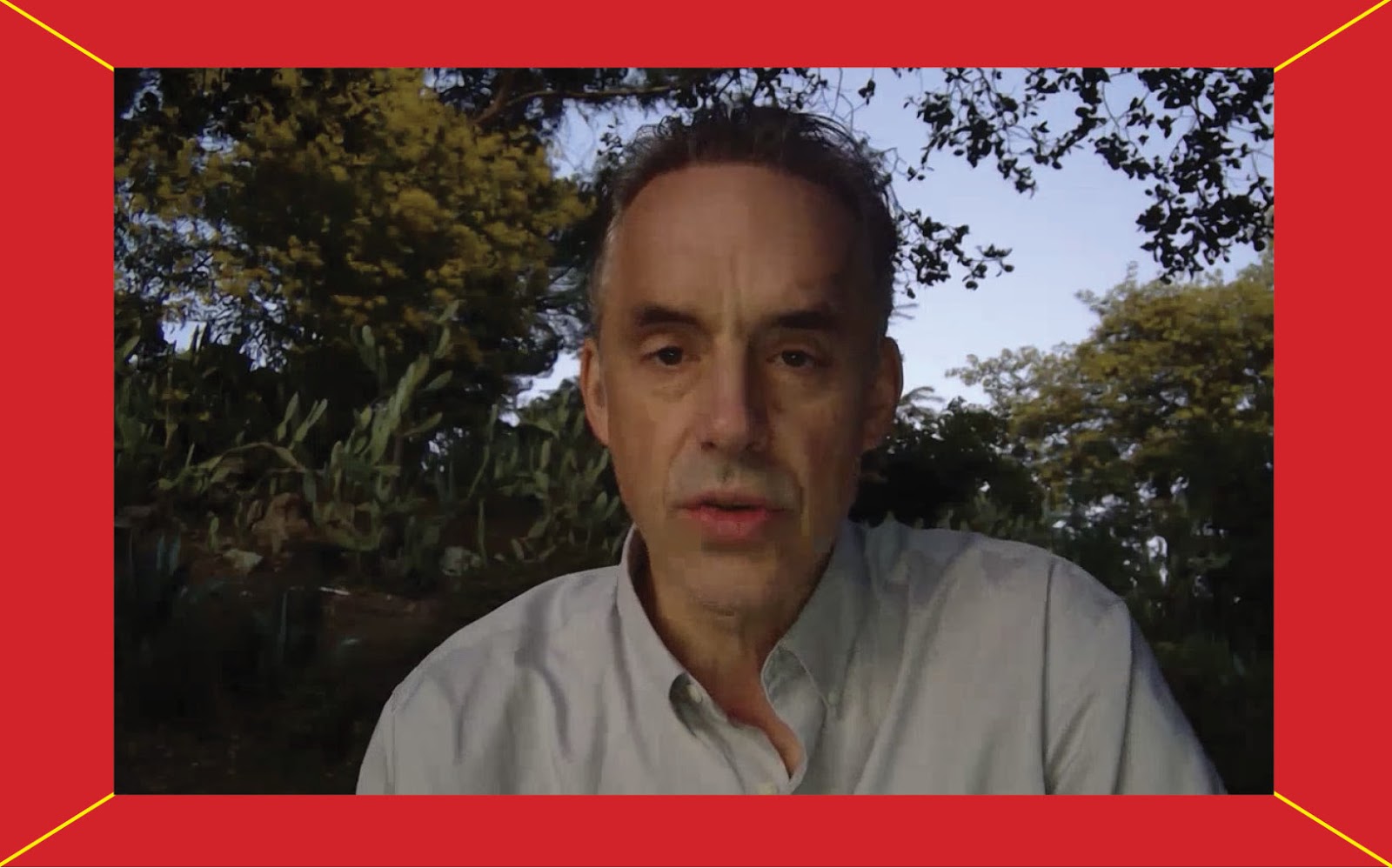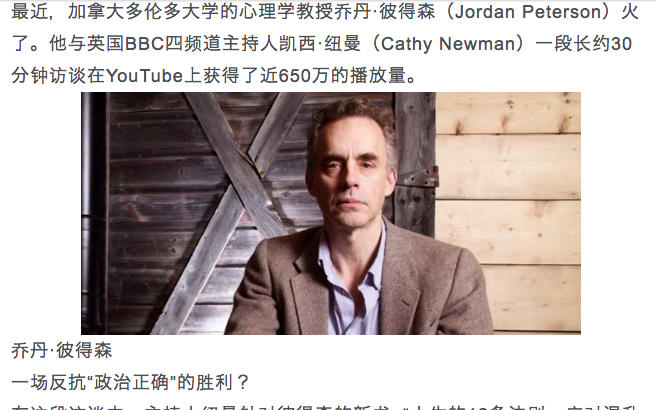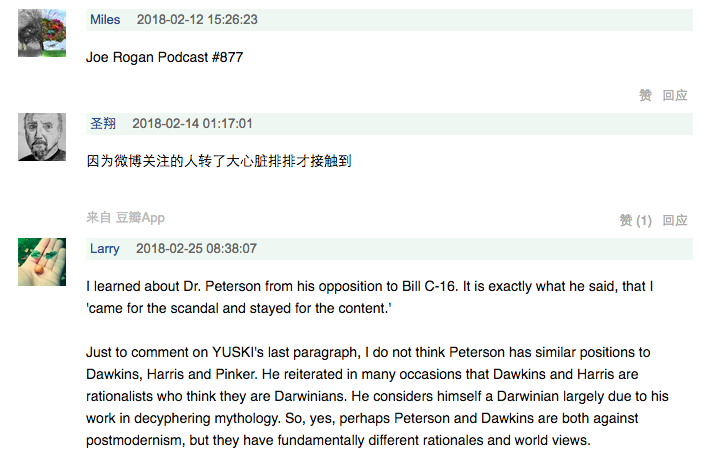Jordan Peterson and China’s ‘white left’

Jordan Peterson, author of 12 Rules for Life: An Antidote to Chaos, is a clinical psychologist and professor of psychology at the University of Toronto. His musings on white privilege, high heels, and pronouns — among other subjects — have earned him a huge following, and endeared him to anti-progressives, those opposed to political correctness, and the international alt-right. The New Yorker calls him “one of the most influential — and polarizing — public intellectuals in the English-speaking world.” And in the wake of his interview with Channel 4’s Cathy Newman on January 16 — in which he parried the British broadcaster’s repeated attempts to paint him as a provocateur and became a meme as a result — it appears Peterson has gained something of a following on the Chinese internet.
The Paper 澎湃新闻 was the first to offer a major piece on the phenomenon, “In comparing lobsters and humans, does Jordan Peterson strike a blow against feminism?” (link in Chinese). The article was widely circulated, popping up on the front page of Sina and other web portals. Meanwhile, a Quartz piece said Peterson had “indeed made a small splash on China’s internet.”
Both stories make note of Peterson’s appeal to those fighting against the so-called “white left” (白左 báizuǒ) in China. The “white left” tag, originating on discussion groups on social media, was initially used to describe progressives and liberals based in the West, but is now often applied to anyone expressing even moderate views. The Paper’s reporting notes the Chinese title of the Cathy Newman interview video was “Confrontation between white-left feminist host and the hardcore reasoning of Jordan Peterson” (白左女权主持人与硬核理性乔丹·彼得森巅峰对决 báizuǒ nǚquán zhǔchírén yǔ yìnghé lǐxìng qiáodān·bǐdésēn diānfēng duìjué).
A recent talk by Fang Kecheng 方可成 offers the best examination of the term’s history and usage. In the talk, Fang says that “white left” is now widely applied to even those not particularly progressive or left-wing, and he includes the example of the Su Xiaohe 苏小和 essay “How the American white left has led Chinese readers into the gutter” (美国白左如何把中国读书人带到沟里 [měiguó báizuǒ rúhé bǎ zhōngguó dúshūrén dài dào gōu lǐ]), referring to both Ayn Rand and John Rawls as “gurus of the ‘white left’” (白左的宗师 báizuǒ de zōngshī). A couple of terms that Western readers might be familiar with, “social justice warrior” and “libtard,” get close to the way baizuo is sometimes used.
The term caught the attention of Fox News’ Tucker Carlson last November, who cited a story by Chenchen Zhang on Open Democracy called “The curious rise of the ‘white left’ as a Chinese internet insult” while talking about the issue on his show. “As Donald Trump once noted of the Chinese, ‘They’re laughing at us.’ He might have been more right than he knew,” he said.
https://www.youtube.com/watch?v=li9SIjNWUZo
How does this relate to Peterson? His videos had already been shared with Chinese subtitles, most notably by Ma Mengjie, a Chinese student studying in Germany who describes herself as part of “a group of people who strive to post one translated video per day on multiple platforms (Weibo, Bilibili and WeChat)” with the goal of “transforming the Chinese society into a place where people can speak the truth freely.” But it wasn’t until the “white left” tag appeared on the Peterson-Newman throwdown that Peterson began to trend.
What some people interpret as Peterson’s red in tooth and claw vision of capitalism — those that don’t “buck up” will be swept aside — meshes with the opinions of many online commentators in China, who espoused social Darwinism during last winter’s Beijing evictions (professor Cheng Yinghong pointed this out in a widely shared piece [link in Chinese] about the “low-end population” last November).
Peterson’s criticism of postmodern neo-Marxism (后现代新马克思主义 hòu xiàndài xīn mǎkèsī zhǔyì) and cultural Marxism (文化马克思主义 wénhuà mǎkèsī zhǔyì) implicates Foucault, campus activists, and the Frankfurt School, among others — the same type of targets that the anti-white-left likes to attack.
A Chinese-born graduate student at the University of Toronto referred to simmering tensions between Chinese students at the university and progressive groups like Black Lives Matter.
As for the scale of Peterson’s popularity in China, judging by social media follower counts, it would appear that he is more of a tool for a small but vocal group — much like he is for the alt-right in the U.S. — than a true online sensation. The Cathy Newman interview helped Peterson gain traction on discussion sites like Zhihu (a Q&A platform similar to Quora), but the professor’s most devoted fans seem to be people like Ma Mengjie, overseas Chinese who consume a lot of English-language content.
A group on Douban calling itself a Peterson study group has just over a hundred members, while multiple groups devoted to Slovenian philosopher Slavoj Žižek — who has trashed Peterson — are home to several thousand. Just on Douban discussion group membership numbers, Peterson trails far behind the postmodern neo-Marxists he despises: the most popular Foucault group has 13,000 followers, Roland Barthes commands more than 5,000 followers, Jacques Derrida has 4,900.
Judging by postings on the Douban study group, many of Peterson’s followers came on prior to the Newman interview. One person mentions Bill C-16, a 2016 bill that added gender identity and gender expression to Canada’s Human Rights Act, which Peterson publicly opposed because he argued it infringed on his freedom of speech.
The most popular thread on the Douban group, “How did you discover Peterson?” (link in Chinese), has the most comments, and reveals that the earliest Peterson adopters had a keen interest in Western pop-philosophy and comedy. Ma made a name for herself subtitling Peterson’s talks, but it would seem that many came to the professor as Anglophone netizens did, through discussions on English-language message boards, or the Joe Rogan and Sam Harris podcasts.
Fang Kecheng makes the point that the “anti-white left movement is largely driven by people that have gone overseas or are currently overseas.” Fang points to the power of Chinese workers in the Bay Area, in particular, and Chinese students in the United States and Europe in general.
Those Chinese workers and students with overseas experiences have become some of the loudest voices on sites like Zhihu, and on discussion boards like Wenxuecity and MIT BBS, popular with overseas Chinese. “After all,” he says, “you need some knowledge (albeit incomplete and highly biased) of racial and immigration problems in order to attack the white left, and most Chinese don’t have that knowledge. In my talk I also mentioned Wenxuecheng and Mitbbs, which are forums for overseas Chinese, as important platforms to form and disseminate the anti-white left narrative.”
A Chinese-born graduate student in psychology at the University of Toronto, electing to remain anonymous for comment on this piece’s connection to students at that university in particular — who make up a large portion of online commenters on Zhihu and elsewhere — referred to simmering tensions between Chinese students at the university and progressive groups like Black Lives Matter. “There’s an antagonistic relationship,” she said, “since most of them have a limited understanding of aboriginal issues or African-Canadian history, and a different understanding of what the university experience is about, and they get the message when they go online that these people are in the university only because of liberal policies. On the internet, it’s like an echo chamber.”
However, a lot of the discussions centered around Peterson on Chinese internet are actually quite sensible. In this thread on Zhihu, the top-voted comment by Huanghun Yelie 荒魂野猎 begins with a reference to conservative academic Thomas Sowell’s 2010 book Intellectuals and Society, about the hubris and manipulative verbal and intellectual games of intellectuals, and goes on to pick apart the debate with more attention to detail than is probably warranted. The author of the post, clearly very interested in conservative American thinkers (his tagline modifies the title of an old Communist anthem, changing “Socialism is good” to “Conservatism is good”), never comes down on one side.
Another reply to the thread, from Steve Shi, who was a student under Peterson, picks apart the Peterson-Newman debate, pointing out places where he agrees and disagrees with his former professor.
The discussion on the above Zhihu thread and others skews conservative. There tends to be little sympathy for political correctness, and there are reactionary and offensive remarks littering the thread, but the conversation appears to be mostly led by a fairly small number of young men with an interest in rhetoric, debate, and conservative thought.
Another Zhihu thread finds overseas students relating their struggles with political correctness. Commenter “Zhihu User” (知乎用户 zhīhū yònghù) wrote:
I believe most students coming to study at the University of Toronto have plans to settle down in Canada. Do you really want your kids to grow up in a white left society? If you’re against the kind of thing, you should throw some support to those that oppose the white left. At least, when you’re talking to fellow classmates, say something like, “I support Professor Peterson because…” and tell them why.
Turning to Weibo, the Channel 4 Newman interview has received shares from some high-profile accounts, along with a video of Peterson being confronted by students. Other than that, most discussion of Peterson is taking place among those that frequent English-language discussion sites.
Turning back to Ma Mengjie again, her Weibo page dedicated to Peterson has approximately 44,000 fans. The number seems impressive, judged against numbers from Western social media sites, but it represents a small following in China.
Ma, who is interviewed in Quartz, comes off fairly innocent, but she is clearly aware of the larger implications of sharing Peterson’s lectures in Chinese. In an exchange screenshotted for her Weibo, a discussion about the need to bring Peterson to China concludes that Jordan Peterson is of limited use when it comes to discussing problems in China. The chat partner asks, “I don’t know why you want to promote Jordan Peterson,” and both agree that “if Peterson was a pill, he’d cure a Western disease.” But they come to agree on a few things, including the dark idea that “postmodernism has had an influence on China, especially when it comes to ethnic minority policy.”
It is important to remember the relative insignificance of the anti-political correctness or anti-progressive movement to larger conversations within China: they are not part of a populist movement like those in the West; they have no particular interest in changing government policy or leadership in the People’s Republic; they are not attempting to build organizations that could have an impact away from digital spaces; and they are less monolithic than the populist movements that helped elect Donald Trump in the United States, right-wing leaders in Europe, and push the UK out of the European Union.
The even smaller group that has taken up Peterson as their idol are even less engaged with domestic politics, are more likely to be current or former students of Canadian and American universities, and are quite often long-term residents in the West.
In any case, Peterson is at least aware of some of his Chinese fans and offered his personal thanks to Ma Mengjie in a recent video and announced that 12 Rules for Life has secured a Chinese publisher and will soon appear in translation. (Manny Guo 郭曼妮, the rights manager of Cheers Publishing 湛庐文化, enthusiastically confirmed that arrangement.)
In other words, Jordan Peterson’s more influential days in China are probably still ahead of him.







